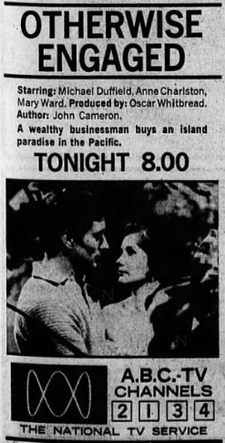
"Otherwise Engaged" is a 1965 Australian television film which aired on ABC. Broadcast in a 60-minute time-slot, it was written by John Cameron and produced in Melbourne. "Otherwise Engaged" aired on 2 June 1965 in Sydney, and Melbourne, and on 23 June 1965 in Brisbane.
"The Sweet Sad Story of Elmo and Me" is a 1965 Australian television film which aired on ABC as part of Wednesday Theatre. It aired on 28 July 1965 in Melbourne and Sydney.
"Campaign for One" is a 1965 Australian television film. A remake of an episode of the BBC series Wednesday Play, it aired in a 60-minute time-slot on ABC on 24 November 1965 in Melbourne, Sydney, and on 5 January 1966 in Brisbane. as part of Wednesday Theatre.
Funnel Web is a 1962 Australian TV play starring Grant Taylor and written by Phillip Grenville Mann. It screened on the ABC and was a suspense drama.
Australian Playhouse was an Australian anthology TV series featuring the work of Australian writers.
The Cell is an Australian play by Robert Wales. The setting is in a school for delinquent girls.
"The Swagman" is a 1965 Australian television play. It aired as part of Wednesday Theatre on 31 March 1965 in Sydney and Melbourne.
"The Pigeon" is the first television play episode of the first season of the Australian anthology television series Australian Playhouse. "The Pigeon" was written by Peter Finnane and directed by Eric Taylor and originally aired on ABC on 18 April 1966.
"The Tape Recorder" is the second television play episode of the first season of the Australian anthology television series Australian Playhouse. "The Tape Recorder" was written by Pat Flower and directed by Henri Safran and originally aired on ABC on 25 April 1966.
"Twelfth Night" is the 41st episode of the second season of the Australian anthology TV series Wednesday Theatre and is based on the play of the same name by William Shakespeare. "Twelfth Night" aired on ABC Television network on 12 October 1966 in Sydney, on 26 October 1966 in Melbourne, and on 16 November 1966 in Brisbane. The play was directed by Ken Hannam and it starred Roger Climpson and Helen Morse.
"The Prowler" is the fourth television play episode of the first season of the Australian anthology television series Australian Playhouse. "The Prowler" was written by Pat Flower and directed by Alan Burke and originally aired on ABC on 9 May 1966.
"Wall to Wall" is the sixth television play episode of the first season of the Australian anthology television series Australian Playhouse. "Wall to Wall" was written by Ann Kinloch and directed by Eric Taylor and originally aired on ABC on 23 May 1966 It starred Gwen Plumb and was shot in Sydney.
"The Winds of Green Monday" is a 1965 Australian television play by Michael Noonan. It aired as part of Wednesday Theatre on August 4, 1965 in Sydney and Melbourne, and on 1 September 1965 in Brisbane. It starred Terry Norris and was directed by Oscar Whitbread.
"What About Next Year" is the eighth television play episode of the first season of the Australian anthology television series Australian Playhouse. "What About Next Year" was written by Richard Lane and directed by Patrick Barton and originally aired on ABC on 6 June 1966 in Melbourne and Sydney
The First Joanna is a 1943 play by Dorothy Blewett that was adapted for radio and television.
"Should the Woman Pay?" is the 13th television play episode of the first season of the Australian anthology television series Australian Playhouse. Originally aired on ABC on 11 July 1966
"Done Away With It" is the 16th television play episode of the first season of the Australian anthology television series Australian Playhouse. "Done Away With It" was written by Pat Flower and directed by Henri Safran and originally aired on ABC on 1 August 1966.
Kain is a 1966 play loosely based on the biblical story of Cain and Abel. It was the first co production between the ABC and the BBC.

"Antarctic Four" is the ninth television play episode of the first season of the Australian anthology television series Australian Playhouse.
"The Man Who Saw It" is a 1966 Australian TV play written by Allan Trevor and directed by John Croyston. It was an original for Australian television and aired as part of Wednesday Theatre on ABC on 2 November 1966 in Sydney.


